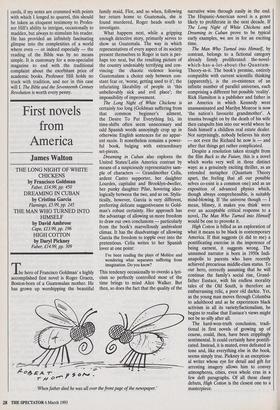First novels from America
James Walton
THE LONG NIGHT OF WHITE CHICKENS by Francisco Goldman Faber, £14.99, pp. 450 DREAMING IN CUBAN by Cristina Garcia Flamingo, f5.99, pp, 245 THE MAN WHO TURNED INTO HIMSELF by David Ambrose Cape, £13.99, pp. 196 HIGH COTTON by Daryl Pickney Faber, f14.99, pp. 309
he hero of Francisco Goldman' s highly accomplished first novel is Roger Graetz, Boston-born of a Guatemalan mother. He has grown up worshipping the beautiful family maid, for, and so when, following her return home to Guatemala, she is found murdered, Roger heads south to investigate.
What happens next, while a gripping enough detective story, primarily serves to show us Guatemala. The way in which representatives of every aspect of its society present themselves to Roger in turn is per- haps too neat, but the resulting picture of the country undeniably terrifying and con- vincing: the chaotic violence leaving Guatemalans a choice only between con- stant fear or, 'worse, getting used to it'; the infuriating likeability of people in 'this unbelievably sick and evil place'; the impossibility of improvement.
The Long Night of White Chickens is certainly too long (Goldman suffering from that common beginner's ailment, the Desire To Put Everything In), its time-shifts often seem unnecessary and odd Spanish words annoyingly crop up in otherwise English sentences for no appar- ent razor:. It nonetheless remains a power- ful book, bulging with extraordinary set-pieces.
Dreaming in Cuban also explores the United States! Latin America contrast by means of a suspiciously representative sam- ple of characters — Grandmother Cella, ardent Castro supporter, her daughter Lourdes, capitalist and Brooklyn-dweller, her punky daughter Filar, hovering ideo- logically between the two, and so on. Stylis- tically, however, Garcia is very different, preferring delicate suggestiveness to Gold- man's robust certainty. Her approach has the advantage of allowing us more freedom to draw our own conclusions — particularly from the book's marvellously ambivalent climax. It has the disadvantage of allowing Garcia the freedom to topple over into the pretentious. Celia writes to her Spanish lover at one point:
I've been reading the plays of Moliere and wondering what separates suffering from imagination. Do you know?
This tendency occasionally to overdo a lyri- cism so perfectly controlled most of the time brings to mind Alice Walker. But then, so does the fact that the quality of the 'When father died he was all over the front page of the newspaper ' narrative wins through easily in the end. The Hispanic-American novel is a genre likely to proliferate in the next decade. If The Long Night of White Chickens and Dreaming in Cuban prove to be typical early examples, we are in for an exciting time.
The Man Who Turned into Himself, by contrast, belongs to a fictional category already firmly proliferated: the-novel- which-has-a-lot-about-the-Quantum- Theory-in-it. The book's premise, entirely compatible with current scientific thinking (apparently), is the co-existence of an infinite number of parallel universes, each comprising a different but possible 'reality'. Rick Hamilton is a publisher and father in an America in which Kennedy went unassassinated and Marilyn Monroe is now 'the nation's favourite grandmother'. A trauma brought on by the death of his wife then catapults him into our world where he finds himself a childless real estate dealer. Not surprisingly, nobody believes his story — not even the Richard he now is — and after that things get rather complicated.
Despite a resolution taken straight from the film Back to the Future, this is a novel which works very well in three distinct ways: as a genuinely exciting thriller, as an extended metaphor (Quantum Theory apart, the feeling that all our possible selves co-exist is a common one) and as an exposition of advanced physics which, though always comprehensible, is suitably mind-blowing. If 'the universe though — I mean, blimey, it makes you think' were ever an acceptable critical response to a novel, The Man Who Turned into Himself would be one to provoke it.
High Cotton is billed as an exploration of what it means to be black in contemporary America. If that suggests (it did to me) a pontificating exercise in the impotence of being earnest, it suggests wrong. The unnamed narrator is born in 1950s Indi- anapolis to parents who have recently achieved precarious middle-class status. To our hero, correctly assuming that he will continue the family's social rise, Grand- father Eustace, with his endless morality tales of the Old South, is therefore an embarrassing relic, a poor old darkie. Yet, as the young man moves through Columbia to adulthood and as he experiences black activism in all its variety/factionalism, he begins to realise that Eustace's views might not be so silly after all.
The hard-won-truth conclusion, tradi- tional in first novels of growing up of course, could, then, have been cripplingly sentimental. It could certainly have pontifi- cated. Instead, it is muted, even defeated in tone and, like everything else in the book, seems simply true. Pickney is an exception- al writer whose eye for detail and gift for arresting imagery allows him to convey atmospheres, cities, even whole eras in a few deft paragraphs. Of all these classy debuts, High Cotton is the closest one to a masterpiece.


















































 Previous page
Previous page